译文对比分析
- 格式:doc
- 大小:26.00 KB
- 文档页数:2
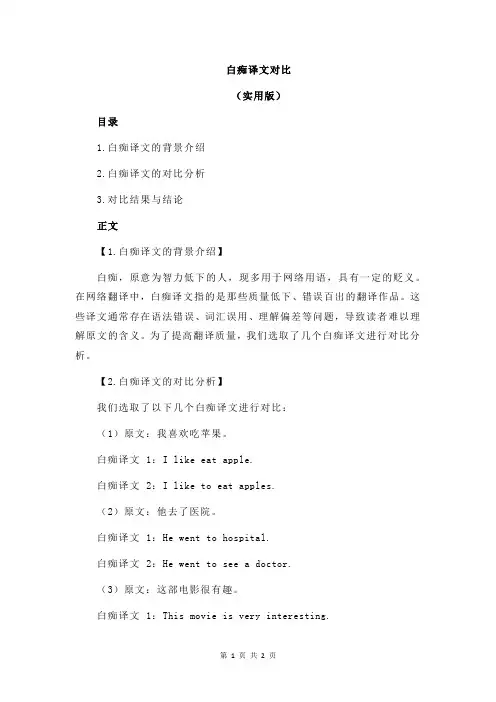
白痴译文对比(实用版)目录1.白痴译文的背景介绍2.白痴译文的对比分析3.对比结果与结论正文【1.白痴译文的背景介绍】白痴,原意为智力低下的人,现多用于网络用语,具有一定的贬义。
在网络翻译中,白痴译文指的是那些质量低下、错误百出的翻译作品。
这些译文通常存在语法错误、词汇误用、理解偏差等问题,导致读者难以理解原文的含义。
为了提高翻译质量,我们选取了几个白痴译文进行对比分析。
【2.白痴译文的对比分析】我们选取了以下几个白痴译文进行对比:(1)原文:我喜欢吃苹果。
白痴译文 1:I like eat apple.白痴译文 2:I like to eat apples.(2)原文:他去了医院。
白痴译文 1:He went to hospital.白痴译文 2:He went to see a doctor.(3)原文:这部电影很有趣。
白痴译文 1:This movie is very interesting.白痴译文 2:This movie is funny.通过对比分析,我们发现白痴译文存在以下问题:1.语法错误:如“I like eat apple”中的“eat”应为“to eat”;“He went to hospital”中的“hospital”应为“the hospital”。
2.词汇误用:如“I like to eat apples”中的“apples”应为“apple”;“This movie is very interesting”中的“interesting”应为“funny”。
3.理解偏差:如“He went to see a doctor”与原文的意思相差甚远。
【3.对比结果与结论】通过对比分析,我们可以看出白痴译文在语法、词汇和理解方面存在较大问题。
为了提高翻译质量,译者需要加强对原文的理解,避免出现理解偏差;同时,要注意语法和词汇的正确使用,确保译文的准确性。
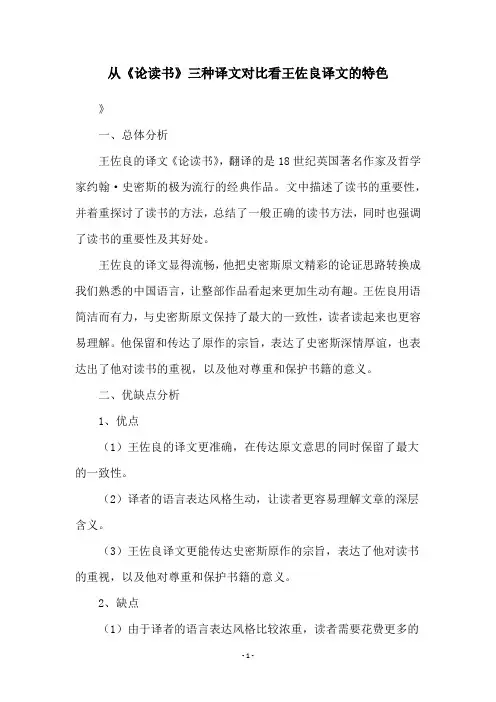
从《论读书》三种译文对比看王佐良译文的特色
》
一、总体分析
王佐良的译文《论读书》,翻译的是18世纪英国著名作家及哲学家约翰·史密斯的极为流行的经典作品。
文中描述了读书的重要性,并着重探讨了读书的方法,总结了一般正确的读书方法,同时也强调了读书的重要性及其好处。
王佐良的译文显得流畅,他把史密斯原文精彩的论证思路转换成我们熟悉的中国语言,让整部作品看起来更加生动有趣。
王佐良用语简洁而有力,与史密斯原文保持了最大的一致性,读者读起来也更容易理解。
他保留和传达了原作的宗旨,表达了史密斯深情厚谊,也表达出了他对读书的重视,以及他对尊重和保护书籍的意义。
二、优缺点分析
1、优点
(1)王佐良的译文更准确,在传达原文意思的同时保留了最大的一致性。
(2)译者的语言表达风格生动,让读者更容易理解文章的深层含义。
(3)王佐良译文更能传达史密斯原作的宗旨,表达了他对读书的重视,以及他对尊重和保护书籍的意义。
2、缺点
(1)由于译者的语言表达风格比较浓重,读者需要花费更多的
时间去理解文章的意义,这可能会影响到读者对译文的阅读速度。
(2)有时,王佐良的译文可能会偏离原文的主要意图,增加了读者理解文章的难度。
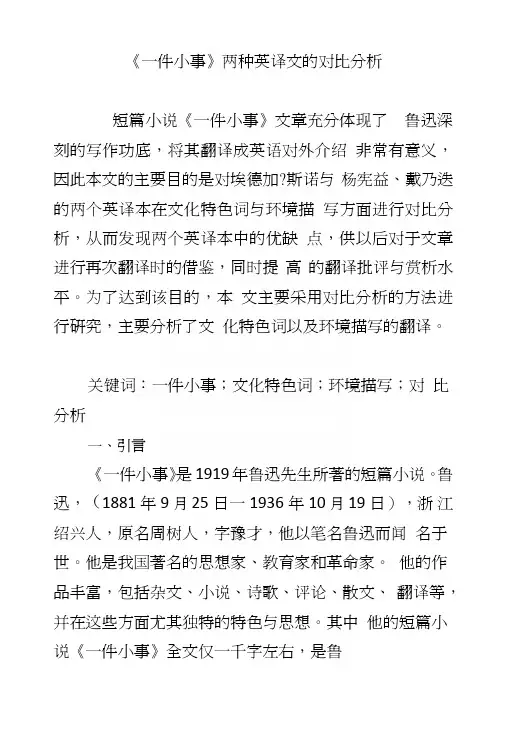
《一件小事》两种英译文的对比分析短篇小说《一件小事》文章充分体现了鲁迅深刻的写作功底,将其翻译成英语对外介绍非常有意义,因此本文的主要目的是对埃德加?斯诺与杨宪益、戴乃迭的两个英译本在文化特色词与环境描写方面进行对比分析,从而发现两个英译本中的优缺点,供以后对于文章进行再次翻译时的借鉴,同时提高的翻译批评与赏析水平。
为了达到该目的,本文主要采用对比分析的方法进行研究,主要分析了文化特色词以及环境描写的翻译。
关键词:一件小事;文化特色词;环境描写;对比分析一、引言《一件小事》是1919年鲁迅先生所著的短篇小说。
鲁迅,(1881年9月25日一1936年10月19日),浙江绍兴人,原名周树人,字豫才,他以笔名鲁迅而闻名于世。
他是我国著名的思想家、教育家和革命家。
他的作品丰富,包括杂文、小说、诗歌、评论、散文、翻译等,并在这些方面尤其独特的特色与思想。
其中他的短篇小说《一件小事》全文仅一千字左右,是鲁迅小说集《呐喊》中篇幅最小的一篇,也是现代小说中传颂最广的名篇之一,历来在现代文学教材中占有重要的地位。
目前《一件小事》的英译本主要有几个译本,杨宪益、戴乃迭的译本,李明的译本,美国学者威廉?q 莱尔(William A. Lyell)的译本和美国记者埃德加?斯诺(Edgar Snow)的译本。
在译本的选择上,目前进行研宄的主要是李明的译本,杨宪益、戴乃迭的译本和威廉?q莱尔的译本,而对于埃德加?斯诺与其他译本的对比分析还比较少。
因此本文选择对埃德加?斯诺的译本与杨宪益、戴乃迭的译本进行对比分析。
二、背景介绍《一件小事》是鲁迅小说中风格独特的名篇,是现代小说和记叙文写作的典范作品。
主要讲述的是民国六年的冬天,“我”雇了一辆人力车拉我去S门,刚近S 门时跌倒出一个女人。
“我”对老女人漠不关心,而车夫却放下车子,扶起那老女人,走向巡警分驻所。
这件事情让“我”感受到了车夫的善良、质朴与诚实,而我的私心与推诿责任更是显得车夫的形象愈加高大起来的事情,并给“我”留下了很深的印象。
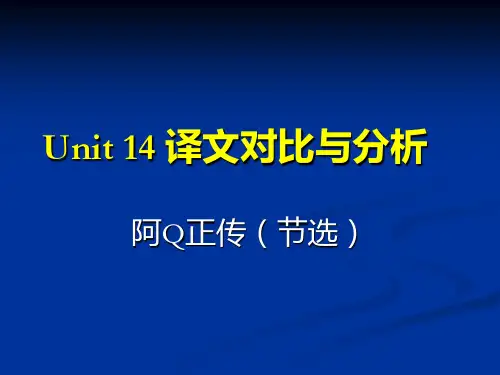
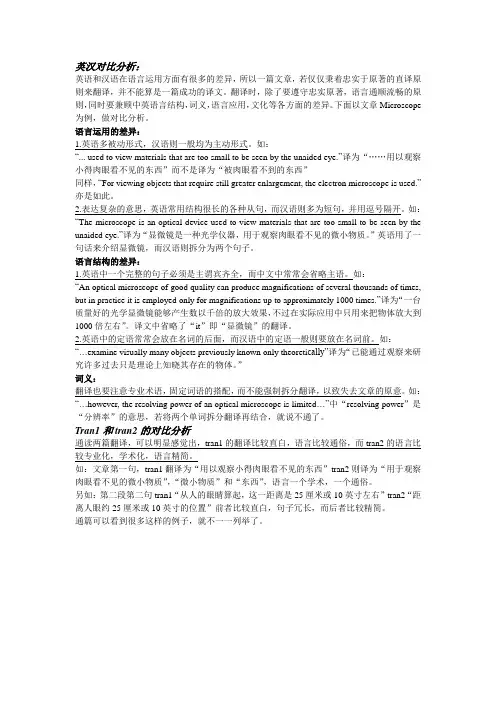
英汉对比分析:英语和汉语在语言运用方面有很多的差异,所以一篇文章,若仅仅秉着忠实于原著的直译原则来翻译,并不能算是一篇成功的译文。
翻译时,除了要遵守忠实原著,语言通顺流畅的原则,同时要兼顾中英语言结构,词义,语言应用,文化等各方面的差异。
下面以文章Microscope 为例,做对比分析。
语言运用的差异:1.英语多被动形式,汉语则一般均为主动形式。
如:“... used to view materials that are too small to be seen by the unaided eye.”译为“……用以观察小得肉眼看不见的东西”而不是译为“被肉眼看不到的东西”同样,“For viewing objects that require still greater enlargement, the electron microscope is used.”亦是如此。
2.表达复杂的意思,英语常用结构很长的各种从句,而汉语则多为短句,并用逗号隔开。
如:“The microscope is an optical device used to view materials that are too small to be seen by the unaided eye.”译为“显微镜是一种光学仪器,用于观察肉眼看不见的微小物质。
”英语用了一句话来介绍显微镜,而汉语则拆分为两个句子。
语言结构的差异:1.英语中一个完整的句子必须是主谓宾齐全,而中文中常常会省略主语。
如:“An optical microscope of good quality can produce magnifications of several thousands of times, but in practice it is employed only for magnifications up to approximately 1000 times.”译为“一台质量好的光学显微镜能够产生数以千倍的放大效果,不过在实际应用中只用来把物体放大到1000倍左右”。
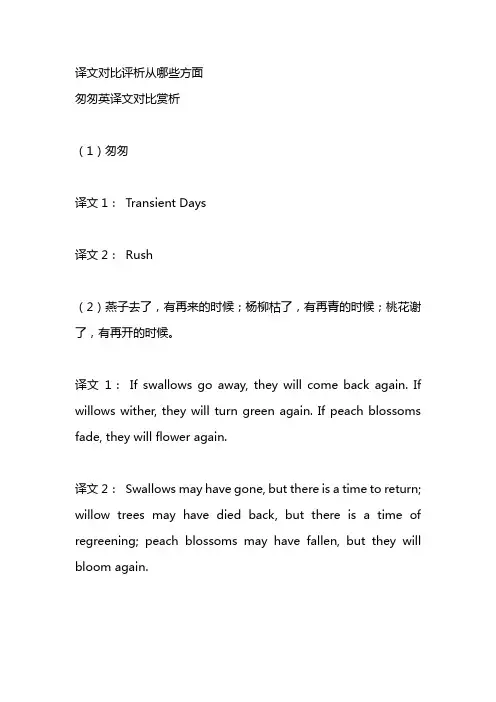
译文对比评析从哪些方面匆匆英译文对比赏析(1)匆匆译文1:Transient Days译文2:Rush(2)燕子去了,有再来的时候;杨柳枯了,有再青的时候;桃花谢了,有再开的时候。
译文1:If swallows go away, they will come back again. If willows wither, they will turn green again. If peach blossoms fade, they will flower again.译文2:Swallows may have gone, but there is a time to return; willow trees may have died back, but there is a time of regreening; peach blossoms may have fallen, but they will bloom again.(3)但是,聪明的,你告诉我,我们的日子为什么一去不复返呢?——是有人偷了他们罢:那是谁?又藏在何处呢?是他们自己逃走了罢:现在又到了哪里呢?译文1:But, tell me, you the wise, why should our days go by never to return? Perhaps they have been stolen by someone. But who could it be and where could he hide them? Perhaps they have just run away by themselves. But where could they be at the present moment?译文2:Now, you the wise, tell me, why should our days leave us, never to return? ----If they had been stolen by someone, who could it be? Where could he hide them? If they had made the escape themselves, then where could they stay at the moment?(4)我不知道他们给了我多少日子;但我的手确乎是渐渐空虚了。
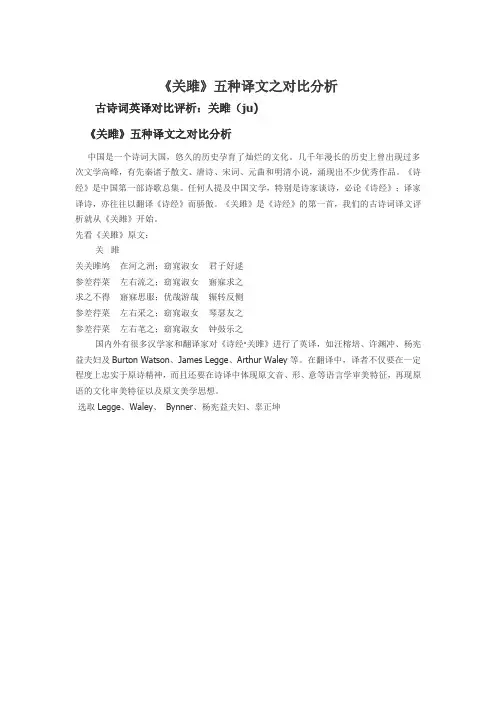
《关雎》五种译文之对比分析古诗词英译对比评析:关雎(ju)《关雎》五种译文之对比分析中国是一个诗词大国,悠久的历史孕育了灿烂的文化。
几千年漫长的历史上曾出现过多次文学高峰,有先秦诸子散文、唐诗、宋词、元曲和明清小说,涌现出不少优秀作品。
《诗经》是中国第一部诗歌总集。
任何人提及中国文学,特别是诗家谈诗,必论《诗经》;译家译诗,亦往往以翻译《诗经》而骄傲。
《关雎》是《诗经》的第一首,我们的古诗词译文评析就从《关雎》开始。
先看《关雎》原文:关雎关关雎鸠在河之洲;窈窕淑女君子好逑参差荇菜左右流之;窈窕淑女寤寐求之求之不得寤寐思服;优哉游哉辗转反侧参差荇菜左右采之;窈窕淑女琴瑟友之参差荇菜左右芼之;窈窕淑女钟鼓乐之国内外有很多汉学家和翻译家对《诗经·关雎》进行了英译,如汪榕培、许渊冲、杨宪益夫妇及Burton Watson、James Legge、Arthur Waley等。
在翻译中,译者不仅要在一定程度上忠实于原诗精神,而且还要在诗译中体现原文音、形、意等语言学审美特征,再现原语的文化审美特征以及原文美学思想。
选取Legge、Waley、Bynner、杨宪益夫妇、辜正坤译文一①:Ode (Kwan ts’eu)Tr. LeggeKwan kwan go the ospreys.On the islet in the river,The modest , retiring, virtuous, young lady: ─For our prince a good mate she.Here long, there short, is the duckweed,To the left, to the right, borne about by the current. The modest , retiring, virtuous, young lady: ─Waking and sleeping, he sought her.He sought her and found her not,And waking and sleeping he thought about her. Long he thought; oh! Long and anxiously;On his side, on his back, he turned ,and back again.Here long, there short, is the duckweed;On the left, on the right, we gather it,The modest , retiring, virtuous, young lady: ─With lutes, small and large, let us give her friendly welcome. Here long, there short, is the duckweed;On the left, on the right, we cook and present it.The modest , retiring, virtuous, young lady: ─With bells and drums let us show our delight in her.译文二②:SongTr. Arthur Waley“Fair, fair”, cry the ospreysOn the island in the river.Lively is this noble lady,Fit bride for our lord.In patches grows the water mallow;To left and right one must seek it.Shy was this noble lady;Day and night he sought her.Sought her and could not get her;Day and night he grieved.Long thoughts, oh, long unhappy thoughts,Now on his back, now tossing on to his side.In patches grows the water mallow;To left and right one must gather it.Shy is this noble lady;With great zither and little we hearten her.In patches grows the water mallow;To left and right one must choose it.Shy is this noble lady;With gongs and drums we will gladden her.译文三③:The Pure-Hearted GirlTr. Witter BynnerOn the river-island─The ospreys are echoing usWhere is the pure-hearted girlTo be our princess?Long lotus, short lotus,Leaning with the current,Turns like our prince in his questFor the pure-hearted girl.He has sought and not found her, Awake, he has thought of her,Asleep, he has dreamed of her,Dreamed and tossed in his sleep.Long lotus, short lotus,Pluck it to left and right,And make ready with lutes and with harpsFor the pure-hearted girl.Long lotus, short lotus,Cook it for a welcome,And be ready with bells and with drumsFor the pure-hearted girl.译文四④:Crying OspreysTr. Yang Xianyi & Gladys YangMerrily the ospreys cry,On the islet in the stream.Gentle and graceful is the girl,A fit wife for the gentleman.Short and long the floating water plants,Left and right you may pluck them.Gentle and graceful is the girl,Awake he longs for her and in his dreams.Filled with sorrowful thoughts,He tosses about unable to sleep.Short and long the floating water plants,Left and right you may gather them.Gentle and graceful is the girl,He’d like to wed her, the qin and se1 playing.Short and long the floating water plants,Left and right you may collect them.Gentle and graceful is the girl,He’d like to marry her, bells and drums beating.注1:two traditional chinese musical instruments, rather like the zither, the former has seven strings and the latter twenty-five strings.译文五⑤:OspreysTr. Gu ZhengkunHark! The ospreys merrily callOn the islet off the river shore.The girl is lovely and slenderly tall,Whom the gentleman would adore.The water plants are long and short,Here and there they can be sought;The lovely girl is slenderly tall,Day and night he would her recall.The first courtship comes to bay,He longs for her wildly night and day.The lingering longing grips him tight,He tosses, unable to sleep at night.The water plants are long and short,Here and there they can be caught;The lovely girl with frail appeal,He’ll befriend with zither and zeal.The water plants are long and short,Here and there they can be stored.The lovely girl is slenderly tall,With bells and drums he wins her after all.Legge译标题不用Osprey而用Ode再于括号内加注(Kwan ts’eu),意在使读者将象声词“关关”与下文第一行的Kwan-Kwan联系起来,用心甚苦。
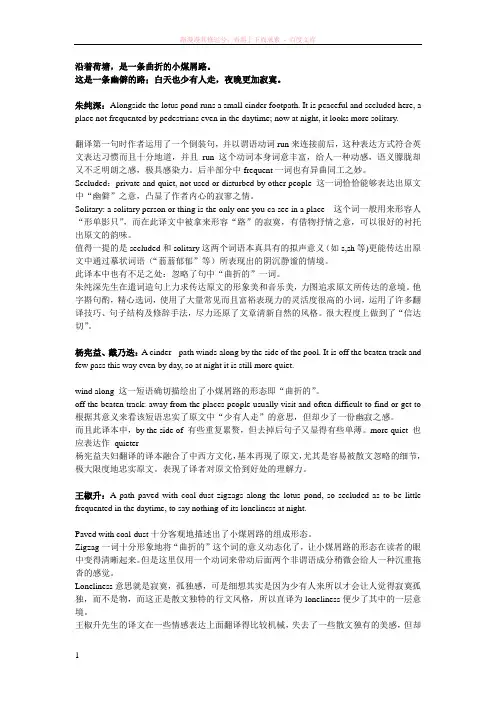
沿着荷塘,是一条曲折的小煤屑路。
这是一条幽僻的路;白天也少有人走,夜晚更加寂寞。
朱纯深:Alongside the lotus pond runs a small cinder footpath. It is peaceful and secluded here, a place not frequented by pedestrians even in the daytime; now at night, it looks more solitary.翻译第一句时作者运用了一个倒装句,并以谓语动词run来连接前后,这种表达方式符合英文表达习惯而且十分地道,并且run 这个动词本身词意丰富,给人一种动感,语义朦胧却又不乏明朗之感,极具感染力。
后半部分中frequent一词也有异曲同工之妙。
Secluded:private and quiet, not used or disturbed by other people 这一词恰恰能够表达出原文中“幽僻”之意,凸显了作者内心的寂寥之情。
Solitary: a solitary person or thing is the only one you ca see in a place 这个词一般用来形容人“形单影只”,而在此译文中被拿来形容“路”的寂寞,有借物抒情之意,可以很好的衬托出原文的韵味。
值得一提的是secluded和solitary这两个词语本真具有的拟声意义(如s,sh等)更能传达出原文中通过摹状词语(“蓊蓊郁郁”等)所表现出的阴沉静谧的情境。
此译本中也有不足之处:忽略了句中“曲折的”一词。
朱纯深先生在遣词造句上力求传达原文的形象美和音乐美,力图追求原文所传达的意境。
他字斟句酌,精心选词,使用了大量常见而且富裕表现力的灵活度很高的小词,运用了许多翻译技巧、句子结构及修辞手法,尽力还原了文章清新自然的风格。
很大程度上做到了“信达切”。
杨宪益、戴乃迭:A cinder - path winds along by the side of the pool. It is off the beaten track and few pass this way even by day, so at night it is still more quiet.wind along 这一短语确切描绘出了小煤屑路的形态即“曲折的”。
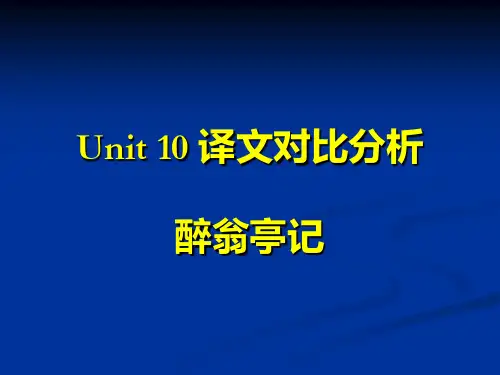
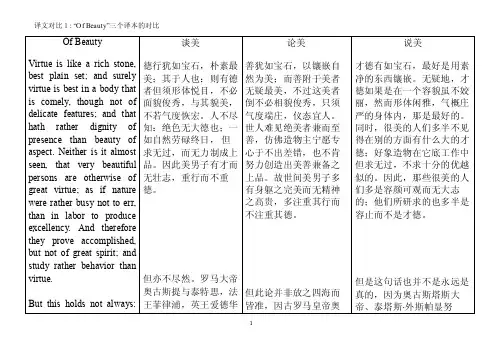
Of BeautyVirtue is like a rich stone, best plain set; and surely virtue is best in a body that is comely, though not of delicate features; and that hath rather dignity of presence than beauty of aspect. Neither is it almost seen, that very beautiful persons are otherwise of great virtue; as if nature were rather busy not to err, than in labor to produce excellency. And therefore they prove accomplished, but not of great spirit; and study rather behavior than virtue.But this holds not always:谈美德行犹如宝石,朴素最美;其于人也:则有德者但须形体悦目,不必面貌俊秀,与其貌美,不若气度恢宏。
人不尽知:绝色无大德也;一如自然劳碌终日,但求无过,而无力制成上品。
因此美男子有才而无壮志,重行而不重德。
但亦不尽然。
罗马大帝奥古斯提与泰特思,法王菲律浦,英王爱德华论美善犹如宝石,以镶嵌自然为美;而善附于美者无疑最美,不过这美者倒不必相貌俊秀,只须气度端庄,仪态宜人。
世人难见绝美者兼而至善,仿佛造物主宁愿专心于不出差错,也不肯努力创造出美善兼备之上品。
故世间美男子多有身躯之完美而无精神之高贵,多注重其行而不注重其德。
但此论并非放之四海而皆准,因古罗马皇帝奥说美才德有如宝石,最好是用素净的东西镶嵌。
无疑地,才德如果是在一个容貌虽不姣丽,然而形体闲雅,气概庄严的身体内,那是最好的。
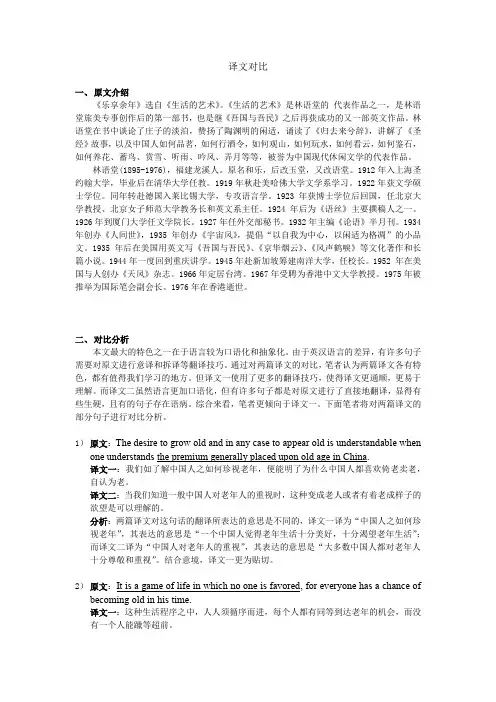
译文对比一、原文介绍《乐享余年》选自《生活的艺术》。
《生活的艺术》是林语堂的代表作品之一,是林语堂旅美专事创作后的第一部书,也是继《吾国与吾民》之后再获成功的又一部英文作品。
林语堂在书中谈论了庄子的淡泊,赞扬了陶渊明的闲适,诵读了《归去来兮辞》,讲解了《圣经》故事,以及中国人如何品茗,如何行酒令,如何观山,如何玩水,如何看云,如何鉴石,如何养花、蓄鸟、赏雪、听雨、吟风、弄月等等,被誉为中国现代休闲文学的代表作品。
林语堂(1895-1976),福建龙溪人。
原名和乐,后改玉堂,又改语堂。
1912年入上海圣约翰大学,毕业后在清华大学任教。
1919年秋赴美哈佛大学文学系学习。
1922年获文学硕士学位。
同年转赴德国入莱比锡大学,专攻语言学。
1923年获博士学位后回国,任北京大学教授、北京女子师范大学教务长和英文系主任。
1924年后为《语丝》主要撰稿人之一。
1926年到厦门大学任文学院长。
1927年任外交部秘书。
1932年主编《论语》半月刊。
1934年创办《人间世》,1935年创办《宇宙风》,提倡“以自我为中心,以闲适为格凋”的小品文。
1935年后在美国用英文写《吾国与吾民》、《京华烟云》、《风声鹤唳》等文化著作和长篇小说。
1944年一度回到重庆讲学。
1945年赴新加坡筹建南洋大学,任校长。
1952 年在美国与人创办《天风》杂志。
1966年定居台湾。
1967年受聘为香港中文大学教授。
1975年被推举为国际笔会副会长。
1976年在香港逝世。
二、对比分析本文最大的特色之一在于语言较为口语化和抽象化。
由于英汉语言的差异,有许多句子需要对原文进行意译和拆译等翻译技巧。
通过对两篇译文的对比,笔者认为两篇译文各有特色,都有值得我们学习的地方。
但译文一使用了更多的翻译技巧,使得译文更通顺,更易于理解。
而译文二虽然语言更加口语化,但有许多句子都是对原文进行了直接地翻译,显得有些生硬,且有的句子存在语病。
综合来看,笔者更倾向于译文一。
朱自清散文《背影》的两个英译文对比分析朱自清是中国近代文学家,他的著作《背影》深刻地描述了母子关系,展现出家庭温馨、深厚的感情。
值得注意的是,《背影》经历了两次英译,第一次是Hugh M.Stewart在1925年做的译文,第二次是u在1975年做的译文,通过对比两个英译文,可以体会英文文学的乐趣,从而深刻了解其意义。
Hugh M.Stewart在1925年对《背影》做的英译文,重点突出的是“背影”的重要性,朴实而深情。
他把“背影”比作一幅画,把母亲的样子描绘得栩栩如生,把读者引入到一种熟悉的气氛中,唤起平常生活中微妙而又深婉的感情:“许多人曾凝视着这个老人的背影,每次凝视时都会觉得心醉的,因为他把这种自然的温柔,把母爱的可爱深深描绘出来了。
”Stewart的译文让母子之情散发出柔和而温馨的气息,赢得了许多读者的喜爱。
与Stewart的译文相反,u在1975年对《背影》的英译文重点突出的是“背影”的忧伤。
他把母亲的背影比作一个毒药,把读者带入一个深刻而沉重的气氛中,展现了母子情之深:“许多人曾凝视着这位旧日的母亲的背影,每一次凝视都令人心抽痛,因为它把母爱的心灵扎根在人们的心中,令人不禁深叹。
”Lau的译文更多的弥足珍贵,更能把母子之情的深厚感觉传达给读者,也更能使故事形象生动,更能把朱自清散文的主旨表达出来。
以上就是Hugh M.Stewart和u做的两个英译文对比分析。
从它们中可以看出,英文文学享有与汉语文学不同的特点,比如Stewart更重视“背影”深情,Lau更强调“背影”的忧伤。
因此,想要真正理解英语文学,就必须要结合语言特点来把握其中的意义。
另外,这篇对比分析也提醒我们,要充分欣赏英语文学,掌握文学的乐趣,最好的办法就是经常认真地阅读和分析权威的英译文。
总的来说,通过对比Hugh M.Stewart和u的两个英译文,不仅可以体会英文文学的乐趣,还能够深刻理解其意义,更能够通过对比分析,提高对英语文学的认识和理解,促进英语文学的发展和推广。
译文对比评析从哪些方面第一作品主题。
我们首先要明白这部作品或者文章的主题是什么。
这就需要我们认真读下序言和简介,这是理解作品关键的地方。
无论作品有多长,总有一个中心围绕着,我们要找出来。
有时候,一部作品的主题非要看完才会明白。
第二作品人物。
一部文学作品,一般会安排好几个主要人物。
假如这部作品非常长,有好几部,那么人物就会很多,这与作者的设计有一定的关系。
我们知道托马斯·哈代一生共写过十四部长篇小说,但是他的作品人物安排有一个特点就是:两位男主人公和一位女主人公,或者是两位女主人公和一位男主人公,这或与与他自己的体验有一定的关系。
因此,我们了解作品的主要人物还是很重要的。
第三作品结构。
一部好的文学作品,其中的结构安排会是比较细心的。
很多鸿篇巨著,作者一般在结构上不会疏忽。
这方面可以以巴尔扎克、雨果、司汤达为代表。
说到结构我们会想到《一千零一夜》那种比较独特的结构,就是故事套故事的结构,这种结构后来还被很多文学作者所采用了。
我们了解和熟悉作品结构,对于欣赏文学作品还是有着一定的意义。
第四作品风格。
一部文学作品,一定有着比较独特的艺术风格,如浪漫主义、现实主义,古典主义,还是意识流。
每部文学作品都有着不一样的艺术风格,每个时代的作者,一定会书写具有那个时代特征的作品。
如果我们阅读十八世纪的作品,或许会想到与启蒙运动相关的内容。
此外,我们对作品的艺术风格有着一定的了解和领会,对欣赏文艺作品有一定的作用。
第五作品思想。
当我们阅读一部文学作品的时候,总会被作者独特的思维和见解所吸引住,也许这就是其中的魅力所在。
一部优秀的作品,其中的思想性一定与艺术性相匹配的。
作者的人生态度积极或者消极都与那个时代的环境有着密切的关系。
我们了解作品思想,实际上能够比较深入的理解那个时代的历史背景,这是分析一部文学作品不可缺少的。
《傲慢与偏见》翻译译文对比赏析这次期末论文我选择了简·奥斯汀的著名代表作《傲慢与偏见》的翻译译文对比赏析。
《傲慢与偏见》这本书是作者简·奥斯汀以日常生活为素材,一反当时社会上流行的感伤小说的内容和矫揉造作的写作方法,声动地反映了18世纪末到19世纪初处于保守和闭塞状态下的英国乡镇生活和世态人情。
这部社会风情画式的小说不仅在当时吸引了广大的读者,时至今日仍给读者以独特的艺术享受。
作者简·奥斯汀是英国著名女性小说家,她的作品主要关注乡绅家庭女性的婚姻和生活,以女性特有的细致入微的观察力和活泼风趣的文字真实地描绘了她周围世界的小天地。
她的作品格调轻松诙谐,富有喜剧性冲突,深受读者欢迎。
从18世纪末到19世纪初,庸俗无聊的“感伤小说”和“哥特小说”充斥英国文坛。
而奥斯汀的小说破旧立新,一反常规地展现了当时尚未受到资本主义工业革命冲击的英国乡村中产阶级的日常生活和田园风光。
她的作品往往通过喜剧性的场面嘲讽人们的愚蠢、自私、势利和盲目自信等可鄙可笑的弱点。
奥斯汀的小说出现在19世纪初叶,一扫风行一时的假浪漫主义潮流,继承和发展了英国18世纪优秀的现实主义传统,为19世纪现实主义小说的高潮做了准备。
虽然其作品反映的广度和深度有限,但她的作品如“两寸牙雕”,从一个小窗口中窥视到整个社会形态和人情世故,对改变当时小说创作中的庸俗风气起了好的作用,在英国小说的发展史上有承上启下的意义,被誉为地位“可与莎士比亚平起平坐”的作家。
傲慢与偏见以伊丽莎白与达西的感情纠葛为红线,主要描绘了一副绝妙的世俗画。
夏洛特和柯林斯讲究实惠、急于寻找归宿的婚姻没有感情基础,不存在真正的幸福。
家境并不富裕的夏洛特之所以选择虚伪、愚蠢的柯林斯完全是出于经济和面子的考虑,代表了当代主流的婚姻观,从一个侧面反映了妇女的可悲命运。
轻狂无知的莉迪亚和表里不一的威科姆私奔是受美貌和情欲的驱使,丝毫不顾及家人和社会道德准则,二者的结合也是达西为保全体面出钱促成的婚后不久就情淡爱驰了,生活上还要靠亲戚的接济度日。
《高傲与偏见》(节选一)之Pride and Prejudiceby Jane Austen(An Except from Chapter One)译文比较分析节选文章布景:小乡绅贝内特有五个待字闺中的千金, 贝内特太太整天费心着为女儿物色趁心如意的丈夫. 新来的邻居宾利(Bingley)是个有钱的独身汉, 他立即成了贝内特太太追猎的目标.1.It’s a truth universally acknowledged, that a singleman in possession of a good fortune, must be in want of a wife.译文一:凡是有钱的独身汉, 总想娶位太太, 这已经成了一条举世公认的事理.译文二:有钱的独身汉总要娶位太太, 这是一条举世公认的真理.分析:从译文的准确性来看, 译文一和译文二都表达的很准确, 担从翻译的句子结构来讲, 译文二的“有钱的独身汉总要娶位太太”与译文一的“凡是有钱的独身汉, 总想要娶位太太”相比语言更简练, 表达意思更清晰明朗.2.However little known the feelings or views of such aman may be on his first entering a neighborhood, this truth is so well fixed in the minds of the surroundingfamilies that he is considered as the rightful property of some one or other of their daughters.译文一:这样的独身汉, 每逢新搬到一个处所, 四邻八舍虽然完全不了解他的性情如何, 见解如何, 可是, 既然这样的一条真理早已在人们心中根深蒂固, 因这人们总是把他看作是自己某一个女儿理所应得的一笔财富.译文二:这条真理还真够深入人心的, 每逢这样的独身汉新搬到一个处所, 四邻八舍的人家尽管对他的性情见识一无所知, 却把他视为某一个女儿的合法财富.译文一中说“这样的一条真理早已在人们心中根深蒂固”译文二“这条真理还真够深入人心的”, 译文一的译法比力书面化, 使用了“根深蒂固”, 译文二“深入人心”, 两种译法相比力, 我更倾向第一种书面化的译法.3.”My dear Mr. benne” said his lady to him one day ,”have you heard that nether field park is let at last?”译文一:有一天班纳特太太对她的丈夫说:“我的好老爷, 尼日斐花园终于租出去了, 你听说过没有?”译文二:“亲爱的贝特先生”一天, 贝纳特太太对先生说:“你有没有听说内瑟费尔德庄园终于租出去了:”译文一中说“我的好老爷”译文二“亲爱的贝内特先生”很明显可以看出前者更口语化, 符合两人之间的关系, 二后者显得生硬,让人感觉不到两人的亲密关系.(王珍)4.Mr. Bennet replied that he had not.译文一:纳特先生回答道, 他没有听说过.译文二:纳特先生回答道, 没有听说过.分析:译文一语意模糊, 译文中的“他”是指纳特先生, 还是前文提到的其他主人公, 引起语意的混淆, 歧义.译文二就相对简洁明了, 便于理解.5.”But it is,” returned she:” for Mrs. long has just been here, a nd she told me all about it.”译文一:“简直租出去了, ”他说, “朗格太太刚刚上这来过, 她把这件事情的秘闻, 一五一十地都告诉了我.”译文二:“简直租出去了, ”太太说道.“朗太太刚刚来过, 她把这事一五一十地全告诉我了.”分析:二译文相比, 译文一中的“这儿”和“来过”以及“秘闻”和“一五一十地告诉我”是重复表达, 使句子累赘罗嗦, 译文二思路更清晰明了, 表达简洁顺畅, 顺理成章, 理解起来更容易.6.Mr. Bennet made no answer.译文一:班纳特先生没有理睬他.译文二:班纳特先生没有作答.分析:译文一的感情表达有偏差, “没有理睬他”给人感觉说话人的表达带有不良情绪, 语气很硬, 相比而言, 译文二更贴切. 7.”Do not you want to know who has taken it?” cried his wife impatiently.译文一:“你难道不想知道是谁租去的吗?”太太不耐烦地嚷起来了.译文二:“难道你不想知道是谁租去的吗?”太太不耐烦地嚷起来了.分析:比较二翻译, 译文一中“你难道“和译文二中”难道你“的语序用的纷歧样, 译文二语气更突出说话人的气愤和不耐烦, 感情更贴切, 便于读者理解, 译文一的表达就逊色于译文二了. 8.”You want to tell me, and I have no objection to hearing it.”译文一:“既然是你要说给我听, 我听听也无妨.“译文二:“既然你要告诉我, 我听听也无妨.“分析:译文一中的“说给我听“没有译文二中的”告诉我“表达直接.9.This was invitation enough .译文一:这句话是够鼓励他讲下去了.译文二:这句话足以引逗她讲下去了.(1)意译原文中的”invitation”被译为“鼓励她讲下去”体现意译.译者形形色色, 自由而流畅的再现了原文内涵.(2)换形译法原文中”invitation”为名词性质, 为而被译为“鼓励她讲下去”为动词性质.译文二这句话足以逗弄太太讲下去了.(1)意译原文中的”invitation”被译为“逗弄太太讲下去”体现意译.译者形形色色, 自由而流畅的再现了原文内涵.(2)换形译法原文中”invitation”为名词性质, 为而被译为“逗弄太太讲下去”为动词性质.10. “Why, my dear, you must know, Mrs. Long says that Nether field is taken by a young man of large fortune from the north of England; that he came down on Monday in a chaise and four to see the place, and was so much delighted with it that he agreed with Mr. Morris immediately; that he is to take possession before Michaelmasl, and some of his servants are to be in the house by the end of next week.”译文一“哦, 亲爱的, 你得知道, 朗格太太说, 租尼日斐花园的是个阔少爷, 他是英格兰北部的人;听说他星期一那天, 乘着一辆驷马年夜轿车来看房子, 看得非常中意, 就地就和莫理斯先生谈妥了;他要在‘米迦勒节’以前搬进来, 筹算下个周末先叫几个用人来住.“(1)意译, “Why”翻译为“哦”体现了灵活自由的翻译方法,使更加符合原文语境.(2)增词译法, 增加“听说”“筹算”“看得”“那天”以表达原文内涵意义使译文更加流畅, 增强可读性.(3)省词译法,将原文中”with it ”未译出, 符合汉语表达习惯, 使译文流畅.(4)换序译法, 将原文时间状语” by the end of next week”在译文中提前, 符合汉语将状语提前的表达习惯, 符合中文逻辑思维.(5)转性译法, 将原文中”in” 译为“住”, 将介词转译为动词, 符合英美国家比力喜欢用介词, 而汉语则习惯用动词表达.(6)断句译法将原文”Mrs. Long says that Netherfield is taken by a young man of large fortune from the north of England; that he came down on Monday in a chaise and four to see the place,and was so much delighted with it that he agreed with Mr. Morris immediately”两个长句译为多个短句, 使译文易理解.(7)转态译法将原文中”Netherfield is taken by a young man of large fortune”译为语态由主动转为主动, 符合汉语表达习惯.译文二“哦, 亲爱的, 你应该知道, 朗太太说, 内瑟菲尔德让英格兰北部的一个阔少爷租去了;他星期一那天乘坐一辆驷马马车来看房子, 看得非常中意, 当下就和莫理斯先生讲妥了;他筹算赶在米迦勒节以前搬进新居, 下周末以前打发几个用人先住进来.”(1)意译, “Why”翻译为“哦”体现了灵活自由的翻译方法, 使更加符合原文语境.(2)增词译法, 增加“那天”“看得”“新居”“筹算”“打发”, 增强译文可读性和连贯性.(3)省词译法, 将原文中”with it”未译出, 符合汉语表达习惯, 使译文流畅.(4)换序译法, 将原文定语”of large fortune” 地址状语”from the north of England” 时间状语”on Monday” 方式状语”in a chaise”在翻译时分别提前, 并先翻译时间状语后翻译方式状语, 符合汉语表达习惯, 使译文流畅.(5)断句译法, 将原文”that he came down on Monday in a chaise and four to see the place,and was so much delighted with it that he agreed with Mr. Morris immediately”分为3个短句译完, 是译文浅显易懂.11. “What’s his name?”译文一“这人叫什么名字?”(1)翻译多样性, “name”有“名字、姓, 姓名、名称”之意, 而在译文中被译为“名字”.(2)意译“his”译为“这人”翻译灵活自由而且忠实于原文.译文二“他姓什么?”(1)翻译多样性“name”有“名字、姓, 姓名、名称”之意, 而在译文中被译为“姓”.12. “Bingley.”译文一“彬格莱.”译文二“宾利.”(1)二者体现了翻译多样性.13.”Is he married or single?”译文一“有太太的呢, 还是个独身汉?(1)转性译法“single”在原文中应为形容词性质, 而在一文中译为“独身汉”是名词性质.(2)断句译法将原文译为两个短句, 浅显易懂, 自由灵活.译文二“成亲了还是独身?”(1)直译(2)将”married”译为“成亲了”具有中国文化特色.(郭赛赛)14. “Oh! Single, my dear, to be sure! A single man of large fortune; four or five thousand a year. What a fine thing for our girls!”译文一:“噢!是个独身汉, 亲爱的, 确确实实是个独身汉!一个有钱的独身汉;每年有四五千镑的收入.真是女儿们的福气!”译文四:“哦, 是个独身汉, 亲爱的, 肯定是个独身汉!是个拥有一年夜笔财富的独身汉, 一年的收入就有四五千英镑呢.这对我们的女儿来说, 真是天赐良机啊!”译文六:“哦, 独身, 我亲爱的, 一点儿不错!一个十分富有的独身汉, 每年有四五千镑的收入, 这对咱们的几个姑娘是件多好的事呀!”比较:①这句中三句都有几多的增词译法, 例如, 译文一、四中画下划线部份.②对译文一、四来说, 第一句前边已经说了“是个独身汉”, 后面又说“·······是个独身汉”, 在汉语中看来有点啰嗦, 个人认为译文六翻译较好.③ ”What a fine thing for our girls!”对“fine thing”这个词, 译文一“福气”, 译文四“天赐良机”, 译文六“好的事”, 个人认为, 在这里既然是做媒的好事, 译文一和译文四翻译比力合适, 纯真的说是“好事”有些苍白.15. “How so? How can it affect them?”译文一:“这怎么说?关女儿们什么事?”译文四:“何以见得?这对她们来说有什么关系?”译文六:“怎么个好法儿?这和她们有什么关系?”比较:①”How so?...”在这里肯定是一个省略句, 上文说这是女儿们的福气, 天赐良机, 下面贝内特先生应该提出疑惑, 译文一更加的口语化, 翻译比力合适16. “My dear Mr. Bennet,” replied his wife, “how can you be so tiresome! You must know that I am thinking of his marrying one of them.”译文一:“我的好老爷, ”太太回答道, “你怎么这么叫人讨厌!告诉你吧, 我正在盘算, 他要是挑中我们的一个女儿做老婆, 可多好!”译文四:“亲爱的贝内特先生, ”他的妻子回答说, “你怎么这么不开窍?你应该明白, 我正盘算着, 他能将我们的那个女儿去过去呢.”译文六:“我亲爱的贝内特先生, ”太太回答说, “你怎么这么不开窍呀!你要知道, 我是在想他会娶她们之中的哪一个呢.”比较:①既然是在自己家中, 喊自己的先生为贝内特先生有点生疏, 而译文一中“我的好老爷”比力符合汉语的表达习惯②tiresome自己是“令人厌烦, 讨厌”的意思, 但这里贝内特太太显然不是这个意思, 译文四和译文六译法比力好, “不开窍”③最后一句中有个从句, 三句翻译都说得过去, 贝内特太太盘算着把自己的一个女儿嫁给邻居的独身汉.(张蝶媛)17.”Is that his design in settling here?”译文一采纳了断句译法, 将一句话译成了两个分句, 即“他住到这来, 就是为了这个筹算吗?”译文二则采纳了直译法, 坚持了原文的内容与形式,直译成了“他搬到这里就是为了这个筹算?”18.”Design! nonsense, how can you tal k so! But it is very likely that he may fall in love with one of them, and therefore you must visit him as soon as he comes.”译文一采纳了省词译法, 如将“how can you talk so”译成“这创作时间:二零二一年六月三十日是哪的话”省译了“you”, 同时也采纳了意译法, 改变了原句的结构与内容.将“and therefore you must visit him as soon as he come s.”译成“他一搬来, 你就得去访问访问他.”省译了“and therefore”, 同时采纳了断句译法, 将一个句子译成了两个分句.译文二采纳了直译法.依照原文的内容与形式得出译文.19.”I see no occasion for that. You and the girls may go, or you may send them by themselves, which perhaps will be still better, for as you are as handsome as any of them, Mr. Bingley might like you the best of the party.”在对“Mr. Bingley might like you the best of the party”一句的翻译中, 译文一、二均采纳了增词译法, 译文一增加了“你去了”, 译文二增加了“你一去”.在对“for as you are as handsome as any of them”一句的翻译中, 译文一采纳了断句译法, 将原句译成了两个分句, 同时采纳了意译法, 增强了可读性.译文二则采纳了直译法, 依照原文的内容与结构得出了译文.(卢乔)创作时间:二零二一年六月三十日。
罗素自传导言译文对比分析一、原文内容背景介绍What I Lived For是由罗素写的自传。
这是他的一篇咏志散文,若干年来为人们所传诵。
在这短短的几百个个单词中,除却精美准确的用词、飘逸优美的文风和悲天悯人的人文情怀,还有内部环环相扣的紧密逻辑,为人们所叹服。
这是作者在抒发自己的心灵,也是在总结自己生命的体验。
前言部分很好地总结了作者一生的精神生活:“三种激情,简单而又无比强烈的激情——支配了我一生:对爱的渴望,对知识的追求,以及对人类的苦难不堪忍受的怜悯之情。
”原文是一篇关于人生这样一篇严肃话题咏志散文,为语域中的正式语体。
文章命题清楚,说理透彻,逻辑性强,段落严谨,用词讲究,风格凝重而又不乏诙谐。
充满激情和生动的文字使文章在极具说服力的同时又具有文采。
该自传的译文林林总总,不下数十种,但各有千秋。
经过认真阅读三种不同的译本,并和原文进行对比比较。
二、三种译本的对比分析第一种译本《我一生的追求》(杜争鸣译);第二种译本《我为什么生活》(泰云译);第三种译本《我为什么而活着》(胡作玄译)。
首先从题目来看,纵观以上三种译本,基本差不多是属于直译过来的,但是我觉得第一种译文的题目《我一生的追求》(杜争鸣译)更得体,更能符合原文所表达的意境。
第一段第一句的翻译“Three passions, simple but overwhelmingly strong, have governed my life”,三种译本采取了不同的处理方法,杜译本采取了不改变原文的自然顺序,并同时保留了原文的自然停顿节奏。
而其他两种都是改变了原文的自然顺序,泰译本采取了“合”的思想,直接把三个小短句合为一句话,译成三种单纯而极其强烈的激情支配着我的一生;胡作玄译成对爱情的渴望,对知识的追求,对人类苦难不可遏制的同情心,这三种纯洁但无比强烈的激情支配着我一生。
所以,在第一句的处理上第一种(杜争鸣译)翻译的好,既简明扼要又准确,实际上,这种通过保留语序来保留原文紧凑的方式,译文会更自然、通顺,还能达到高效的目的。
话说宝玉在林黛玉房中说"耗子精",宝钗撞来,讽刺宝玉元宵不知"绿蜡"之典,三人正在房中互相讥刺取笑。
杨宪益:Pao-yu,as we saw, was in Tai-yu’s room telling her the story about the rat spirits when Pao-chai burst in and teased him for forgetting the “green wax” allusion on the night of the Feast of Lanterns.
霍克斯: We have shown how Bao-yu was in Dai-yu’s room telling her the story of the magic mice; how Bao-Chai burst in on them and twitted Bao-yu with his failure to remember the ‘green wax’ allusion on the night of the Lantern Festival; and how the three of them sat teasing each other with good-humored banter.
对比分析:杨宪益和霍克斯在翻译“耗子精”采用来了不同的处理方法,前者使用了异化”rat spirits”,后者用的是归化法”magic mice”,使用归化法更受英美读者的亲乃。
但是二者同时采用了增译法,增添了the story,原文并没有。
在翻译“宝玉不知绿烛之典”的“不知”,英文1用的是“forgetting”,而译文2用的是“with failure to ”,显然译文2更符合英美的表达习惯。
那宝玉正恐黛玉饭后贪眠,一时存了食,或夜间走了困,皆非保养身体之法。
幸而宝钗走来,大家谈笑,那林黛玉方不欲睡,自己才放了心。
杨宪益:Pao-yu felt relieved as they laughed and made fun of each other, for he had feared that sleeping after lunch might give Tai-yu indigestion or insomnia that night, and so injure her health. Luckily Pao-chai’s arrival and the lively conversation that followed it had woken Tai-yu up.
霍克斯: Bao-yu had been afraid that by sleeping after her meal Dai-yu would give herself indigestion or suffer from insomnia through being insufficiently tired when she went to bed at night, but Bao-chai’s arrival and the lively conversation that followed it banished all Dai-yu’s desire to sleep and enabled him to lay aside his anxiety on her behalf.
对比分析:译文一对原文语序进行了调整,先说了“放心”,再说“担心”,但并不如不调整顺序的逻辑强。
译文二只是用了一个“but”就把原文意思分层了两层,逻辑更加清晰,符合西方人注重逻辑的习惯。
原文中的“谈笑”是动词,而两个译文版本都是译的“the lively conversation”,是名词,体现了汉语重动态,英文重静态的特点。
忽听他房中嚷起来,大家侧耳听了一听,林黛玉先笑道:"这是你妈妈和袭人叫嚷呢。
那袭人也罢了,你妈妈再要认真排场她,可见老背晦了。
"
杨宪益:Just then, a commotion broke out in Pao-yu’s apartments and three of th em pricked up their ears.
“It’s your nanny scolding Hai-jen,” announced Tai-yu.
“There’s nothing wrong with Hai-jen, yet your nanny is for ever nagging at her. Old age has befuddled her.”
霍克斯: Just then a sudden commotion arose from the direction of Bao-yu’s room and the three of them stopped talking and turned their heads to listen. Dai-yu was the first to speak:
“That’s your Nannie quarrelling with Aroma,” she said. ‘To think how that poor girl goes out of her way to be nice to the old woman, yet still she manages to find fault with her! She really must be getting senile.
译文对比分析:在翻译“侧耳听了一听”时,前者用了“pricked up their ears.”是中国人的表达习惯,中国自古以来就有“竖耳倾听”这一说话,显然杨宪益采用的是异化法,保留了中国的文化;而后者用的是“turned their heads to listen”,属于归化法,接近译文读者。
“排场”、“老背晦”都是中国独有的说法,二者的译法仍然采用了以上方法,译文一接近原文读者,译文二则是顾及译文读者。
而且二者都同样使用了增译法,原文中并没有转折连词,而两个译文在翻译的时候根据需要都加了“yet”,体现了英文多用连接词,汉语少用或不用连接词的特点。